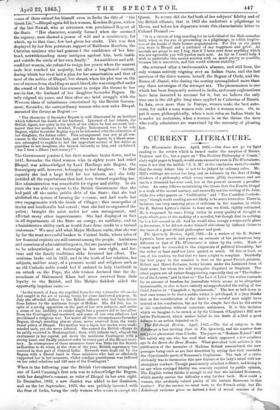The Quarterly Review, April, 1865.—In a review of Sir E.
Bulwer Lytton's later novels and poems an estimate of his pretentious very different to that of The Westminster is taken by the critic. Much of course must be conceded to the exigencies of political friendship, but the writer at least need not have quoted so much. Of this at least, as one of his readers, we feel that we have a right to complain. Decidedly the best paper in the number is that on the great French printers, Robert and Henri Estianne, better known under the Latinized form of their name, but whom few will recognize disguised as Stephens. The other papers are all rather disappointing, especially that on "The Galler- ies of the Louvre," and in that on" The Law of Libel" the writer contends for an amount of freedom for journalists which seems to be altogether unreasonable, or else to have entirely misapprehended the ruling of the Chief Justice in "Campbell v. Spottiswoode." The law as laid down in that ease seems to be that a public writer is privileged, if a jury thinks that on due consideration of the facts a fair-minded man might have arrived at his conclusions, but not by the simple fact that he did arrive at his conclusions without conscious unfairness. It is this decision which we imagine to be struck at by Sir Coleman O'Loghlan's Bill now before Parliament, which makes belief in the truth of a libel a good defence to an action foimded on it.






























 Previous page
Previous page